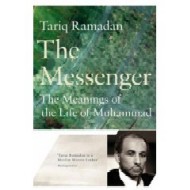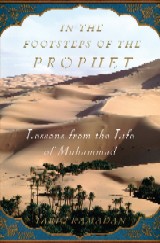Named by Time magazine as one of the 100 most important innovators of the century, Tariq Ramadan is a leading Muslim scholar, with a large following especially among young European and American Muslims. Now, in his first book written for a wide audience, he offers a marvelous biography of the Prophet Muhammad, one that highlights the spiritual and ethical teachings of one of the most influential figures in human history.
Lessons from the Life of Muhammad

Here is a fresh and perceptive look at Muhammad, capturing a life that was often eventful, gripping, and highly charged. Ramadan provides both an intimate portrait of a man who was shy, kind, but determined, as well as a dramatic chronicle of a leader who launched a great religion and inspired a vast empire. More important, Ramadan presents the main events of the Prophet’s life in a way that highlights his spiritual and ethical teachings. The book underscores the significance of the Prophet’s example for some of today’s most controversial issues, such as the treatment of the poor, the role of women, Islamic criminal punishments, war, racism, and relations with other religions. Selecting those facts and stories from which we can draw a profound and vivid spiritual picture, the author asks how the Prophet’s life can remain–or become again–an example, a model, and an inspiration. And how can Muslims move from formalism–a fixation on ritual–toward a committed spiritual and social presence?
In this thoughtful and engaging biography, Ramadan offers Muslims a new understanding of Muhammad’s life and he introduces non-Muslims not just to the story of the Prophet, but to the spiritual and ethical riches of Islam.
Released in February 2007 but already sold at the Toronto Islamic Convention.
A STARRED REVIEW in Publishers Weekly Review (USA)
In the Footsteps of the Prophet: Lessons from the Life of Muhammad
Tariq Ramadan. Oxford, $23 (208p) ISBN 978-0-19-530880-8
London-based Ramadan, the Oxford research fellow who authored Western Muslims and the Future of Islam, is probably best known for being denied entry into the United States, based on alleged violations of the Patriot Act.
This excellent, engaging book ought to turn public attention back toward Ramadan as a writer and a skilled interpreter of Islamic history. In deliberately brief chapters, Ramadan brings Muhammad to life. He highlights Muhammad’s resolute faith in spite of setbacks like poverty and being orphaned, and upholds the prophet as a spiritual hero-bravely compassionate and unusually tolerant of others, including non-Muslims.
Ramadan notes his extraordinary kindness, even to those he battled. For example, a slave who had been given to Muhammad turned down emancipation, saying he preferred service to Muhammad over freedom with anyone else. (Muhammad immediately freed the slave and adopted him as his own son.) Similar tales of mercy lace through Muhammad’s life: In the midst of a battle march, Muhammad advised his troops to be careful not to hurt a litter of puppies on the roadside; on another occasion, Muhammad released prisoners of war because they had taught community children how to read and write.
Ramadan ably demonstrates why Muhammad is a spiritual paragon to the followers of Islam. (Feb.)






Video
[23:34 min.]
[The Messenger->http://www.brightcove.tv/title.jsp?title=1395583296&channel=1244752582]
The Meanings of the Life of Muhammad
Discussion with Tariq RAMADAN & Martin SHORT
Epilogue – Press TV
This is one of the best books I have read about Prophet Muhammad. Being an American and even though I have read much about our Prophet, this book came alive for me. I actually felt like I was walking with the Prophet during his journey. At the end, I was crying at the death of our Beloved Prophet. Thanks so much for this inspirational and enlightening book.
As-Salaamu-Alaikum wa-Rahmatullahi wa-Barakatuhu
Dear Brother Ramadan Tariq:
I enjoyed reading your book The Messenger The Meanings of the Life of Muhammad . I do have a question, though, about Mariyah (RA)who bore Prophet Muhammad (SAW)’s son Ibrahim. Although she came as a slave girl sent to him by Muqauqis, ruler of Egypt, didn’t Prophet Muhammad (SAW)give her respect, restore her human dignity and take her as his own, exemplifying the highest respect Islam endows to women? Wasn’t concubinage outlawed in Islam before the death of Prophet Muhammad (SAW)? My understanding is that Mariyah (RA)gained the same title of respect as the Prophet’s wives, Umm al-Mu’minun/Mother of the Believers.
You mention that « Mariyah became the Prophet’s concubine, a practice that Islamic teachings accepted, while they were proceeding by stages… » (p.229) Since Islam was perfected long before Prophet (SAW) left Dunya, how could Mariyah still remain his concubine. I think this needs clarification because it is misleading and creates confusion about women’s position in Islam and marriage in Islam. You cannot have concubines in Islam.
I would have been happy to read the word ALLAH (SWT) rather than God when you quote The Holy Qur’an. As you know that there is no word for ALLAH (SWT) so why should we use an Anglicised term for the sake of European readers. You can have your glossary and explain such terms instead of accomodating unIslamic terms.
I need these clarifications for my own understanding of Islam and for my teaching purposes. We met in Barcelona, Spain in 2004 at a Conference on World Religions.
Salaam,
Sultana Afroz
Is it possible to read the author’s books online, due to the difficult and delayed shipment of books in my country. I would like first to be able to read them online.
Is it possible to obtain this book in Arabic?
I can’t beleive it , in the third century to have a modern book about our prophet Mohammad (SLAWS) making it
with the uptodate thought and approach .For me it is as
a miraculous in this desert of one mode modern thinking.
No doubt Sir Tariq Ramadan you are a great man
and الله يرحم بحق رحمته من علمكم سيدي طارق رمضان